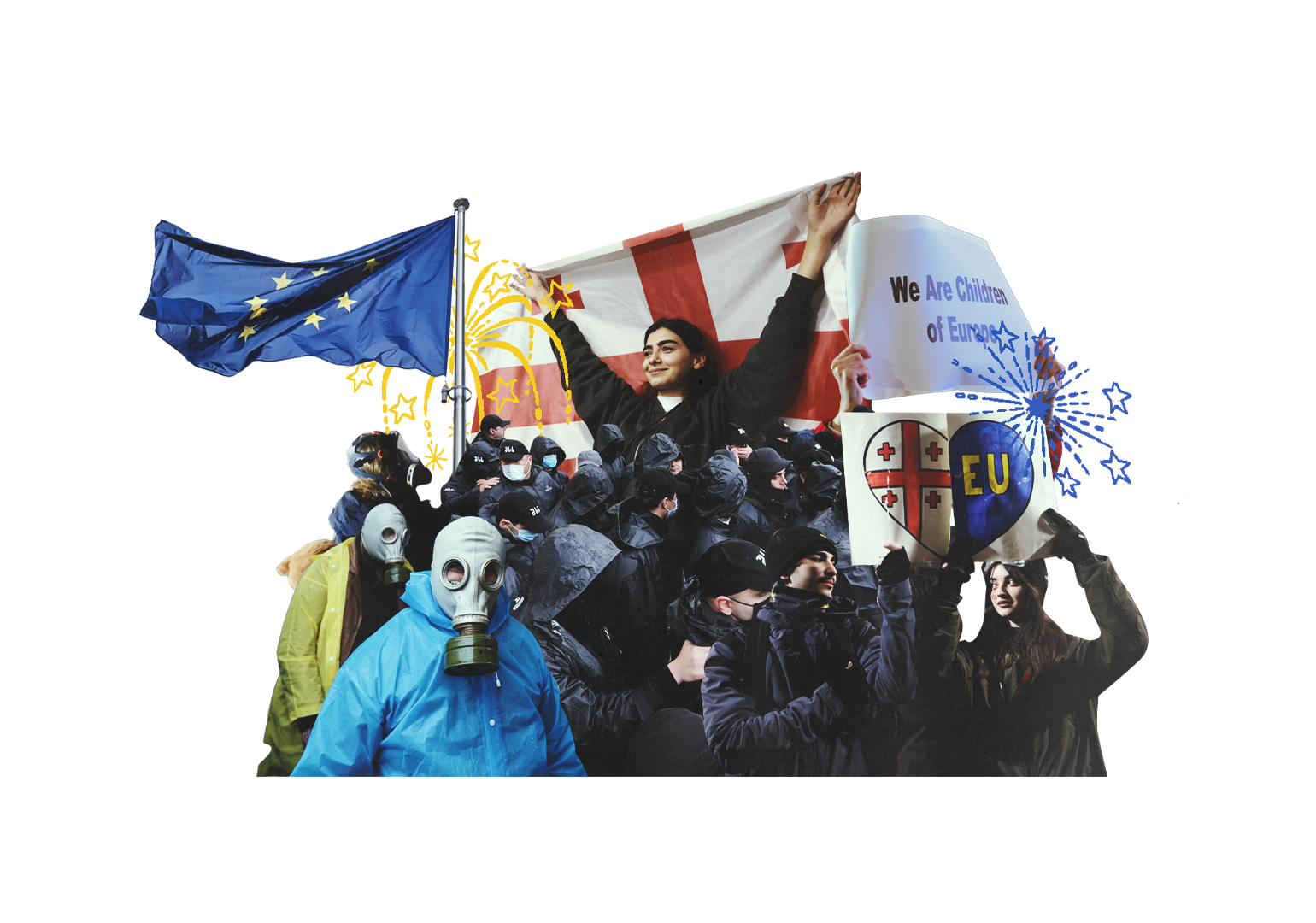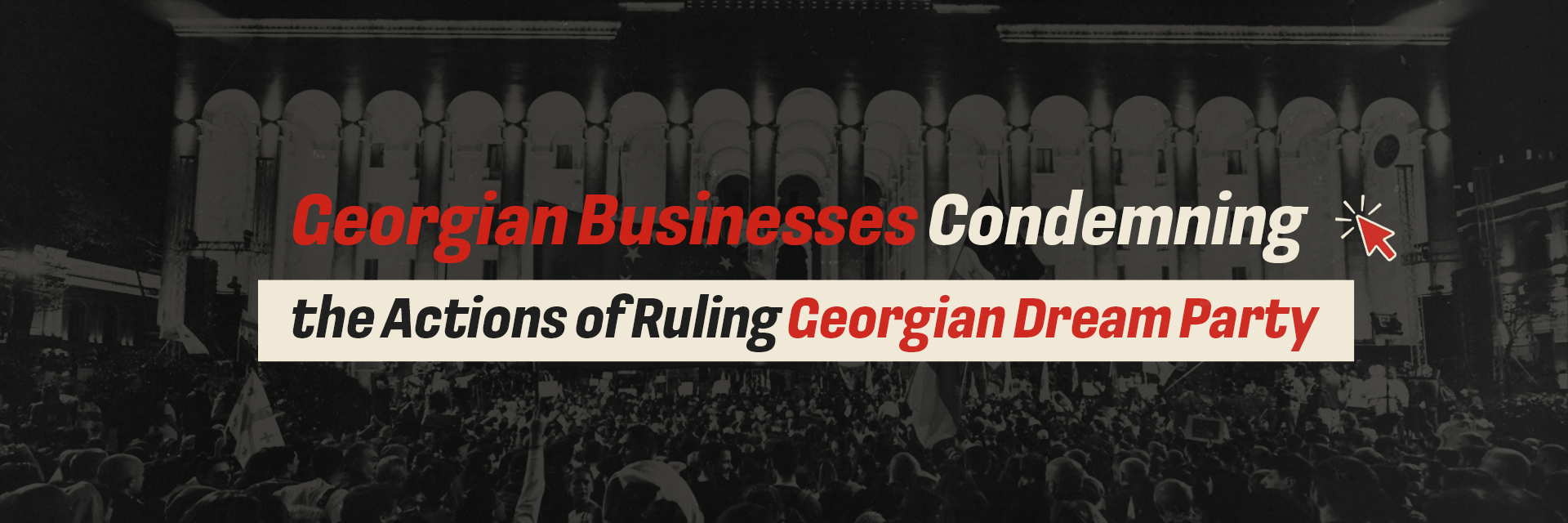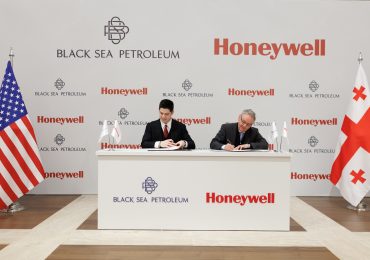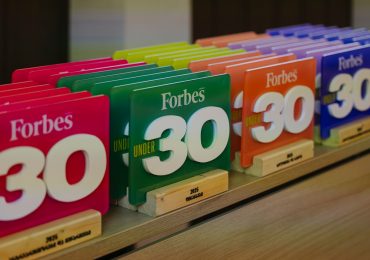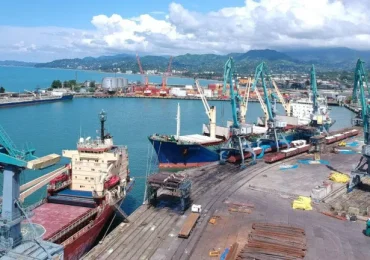Context
On November 28, Georgian Prime Minister Irakli Kobakhidze announced that the Georgian Dream party would not prioritize initiating negotiations on Georgia’s accession to the European Union until the end of 2028.
In his speech, Kobakhidze accused European politicians of using grants and loans allocated to Georgia as tools of blackmail. As a result, he declared that the Georgian Dream government would reject all budgetary grants from the European Union until the specified date. He assured that obligations under the Association Agenda and the Free Trade Agreement would still be fulfilled, albeit through self-financing, without any EU financial assistance.
“We intend to join the European Union not by begging and standing on one leg, but with dignity—through a functioning democratic system and a strong economy. While we will continue our journey toward EU integration, we will not tolerate constant blackmail and manipulation, which is offensive to our country and society,” Kobakhidze stated.
On the same day, the Georgian Dream party approved a new government, which the President of Georgia, opposition parties, and several partner countries deemed illegitimate. Critics alleged that the parliamentary elections held on October 26 were rigged, with the ruling party accused of manipulating results to steal votes from the opposition.
This decision sparked a surge in protests, as demands for new elections intensified. The refusal to open EU accession negotiations further fueled the unrest, culminating in continuous street rallies condemning the Georgian Dream’s actions.
Day 1
On November 28, large-scale protests erupted in Tbilisi, organized by civil activists and opposition parties, opposing the Georgian Dream’s decision. Demonstrators gathered near the Parliament and the party’s central office. Protests also spread to major cities like Kutaisi and Batumi, where participants rallied near local Georgian Dream offices and at Era Square, respectively.
Following Kobakhidze’s announcement, Georgian President Salome Zourabichvili hosted EU ambassadors at her residence for talks. Opposition leaders later joined the discussions and issued a joint statement declaring the parliamentary elections fraudulent and the government illegitimate.
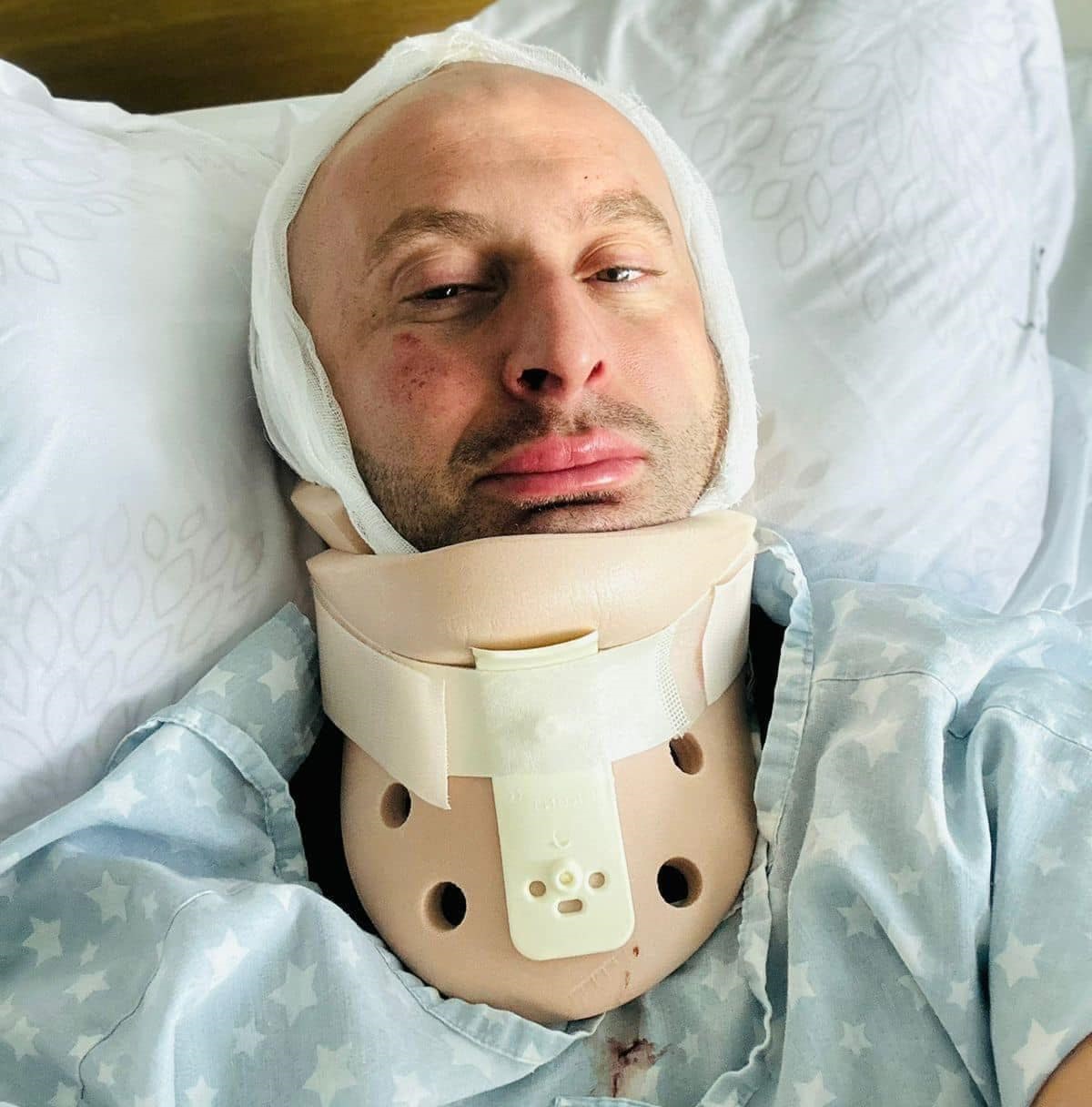
Tensions escalated during the rally near Parliament. Police employed water cannons and pepper spray, resulting in injuries to protesters and journalists. By nightfall, law enforcement had detained 43 individuals. Clashes also broke out in Kutaisi, where one person was arrested for blocking roads.
Day 2
On November 29, protests intensified outside Parliament, with demonstrators demanding early elections. Police dismantled barricades erected by protesters and forcibly cleared the area. Once again, they resorted to using water cannons and other crowd-control measures.
Journalists and media representatives were injured during the dispersal, and footage revealed excessive use of force and obstruction of media personnel. Local and international organizations voiced their concerns over the violence.
Day 3
By November 30, the protests had grown, with approximately 200,000 participants rallying in Tbilisi, according to the military analytical portal Visioner. Riot police dispersed demonstrators using tear gas and were seen physically assaulting smaller groups of protesters.
One shocking incident involved riot police storming the Rustaveli Theater, where protesters had sought refuge. Video footage showing police beating a fallen protester sparked outrage.
The Ministry of Internal Affairs reported the detention of 107 individuals during the night of November 29-30. The United States responded by suspending its strategic partnership agreement with Georgia, signed in 2009.
Day 4
On December 1, protests continued outside Parliament and the Public Broadcasting building, with demonstrators accusing the media of biased reporting. They demanded live coverage and ultimately secured airtime to inform the public about ongoing events.
Violence persisted near Parliament as protesters clashed with law enforcement. Protesters hurled stones and pyrotechnics, while police responded with tear gas and water cannons. Fires broke out in parts of the Parliament building but were quickly extinguished.

That day, Georgian Ambassador to the U.S., David Zalkaliani, announced his resignation.
Day 5
On December 2, the protests near Parliament drew several thousand participants. Early in the evening, police dispersed the crowd, preventing them from approaching the building. Water cannons and tear gas were once again used to suppress resistance.
Protesters constructed barricades and used pyrotechnics to slow police advances. Reports of excessive force and detentions continued, with 23 protesters and 3 police officers hospitalized.
The Ministry of Internal Affairs confirmed that 293 individuals had been detained as of December 3. Additionally, 143 law enforcement officers sustained injuries during the clashes.
Meanwhile, Bidzina Ivanishvili and nine other officials were banned from entering the Baltic states
Day 6
The protests resumed on December 3, centered around Parliament. Law enforcement used water cannons and tear gas to disperse the crowd, which moved to various locations across the city.
The Ministry of Internal Affairs detained 22 protesters that day. The Ministry of Health reported that 15 individuals were hospitalized due to injuries sustained during clashes on Rustaveli Avenue.

The Special Investigation Service launched an inquiry into alleged abuses of power by law enforcement against protesters and media personnel.
In a significant development, Georgian Public Broadcaster offered to organize a public discussion between the Prime Minister, Parliament Speaker, and former Georgian Dream ministers.
Over six days, Georgia’s ambassadors to the Czech Republic, Lithuania, the Netherlands, and Bulgaria, along with the acting ambassador to Italy, resigned.
Day 7
On December 4, the seventh day of the protests, representatives from the Ministry of Internal Affairs conducted raids at the homes of civil activists and opposition party offices. Among those targeted were the founders of the Facebook group Daitove and the youth office of the National Movement party, as well as the offices of the Girchi and Droa parties.
During the raid on the Droa office, police arrested Nika Gvaramia, founder of the Akhali party and leader of the Coalition for Changes. He was taken to the city’s main police department and subsequently to a temporary detention center. Gvaramia was arrested alongside Gela Khasaya, a member of Girchi.
Law enforcement also detained Zviad Tsetskhladze, founder and leader of the organization Dafioni, as well as Vepkho Kasradze and Vaso Kadzelashvili, members of the Strong Georgia movement. Additionally, during a raid on the United National Movement office, five members of the party’s youth wing were arrested.
Meanwhile, police began searching and detaining citizens heading toward the ongoing rally. Tensions escalated near the Courtyard Marriott hotel, where opposition party representatives—those who had overcome barriers in the parliamentary elections—were gathering. Unknown individuals gathered outside the hotel, verbally and physically confronting opposition leaders. Police arrested Zura Datunashvili, a member of Akhali, as he was leaving the meeting of opposition parties.
Following these repressive actions, Irakli Shaishmelashvili, the head of the Operational Planning Division of the Urgent Tasks Department of the Ministry of Internal Affairs, resigned in protest.
In the evening, police arrested Aleko Elisashvili, leader of the Citizens party.
Despite these efforts to suppress the protests, the demonstrators remained undeterred, with their rally continuing near Parliament without interruption.
Day 8
Protests persisted for the 8th consecutive day across Tbilisi and other major Georgian cities as the Georgian Dream government intensified its repressive measures.
On December 5, police arrested actor Andro Chichinadze, detaining him at his residence. Stand-up comedian Onise Tskhadadze was also apprehended at his home. The Ministry of Internal Affairs charged them, along with three others—including a foreign citizen—with organizing group violence, participating in it, and publicly inciting violent action. These charges carry a potential penalty of up to nine years in prison.
During a demonstration in Kutaisi, police detained a minor who lost consciousness amidst their efforts to restrain him.
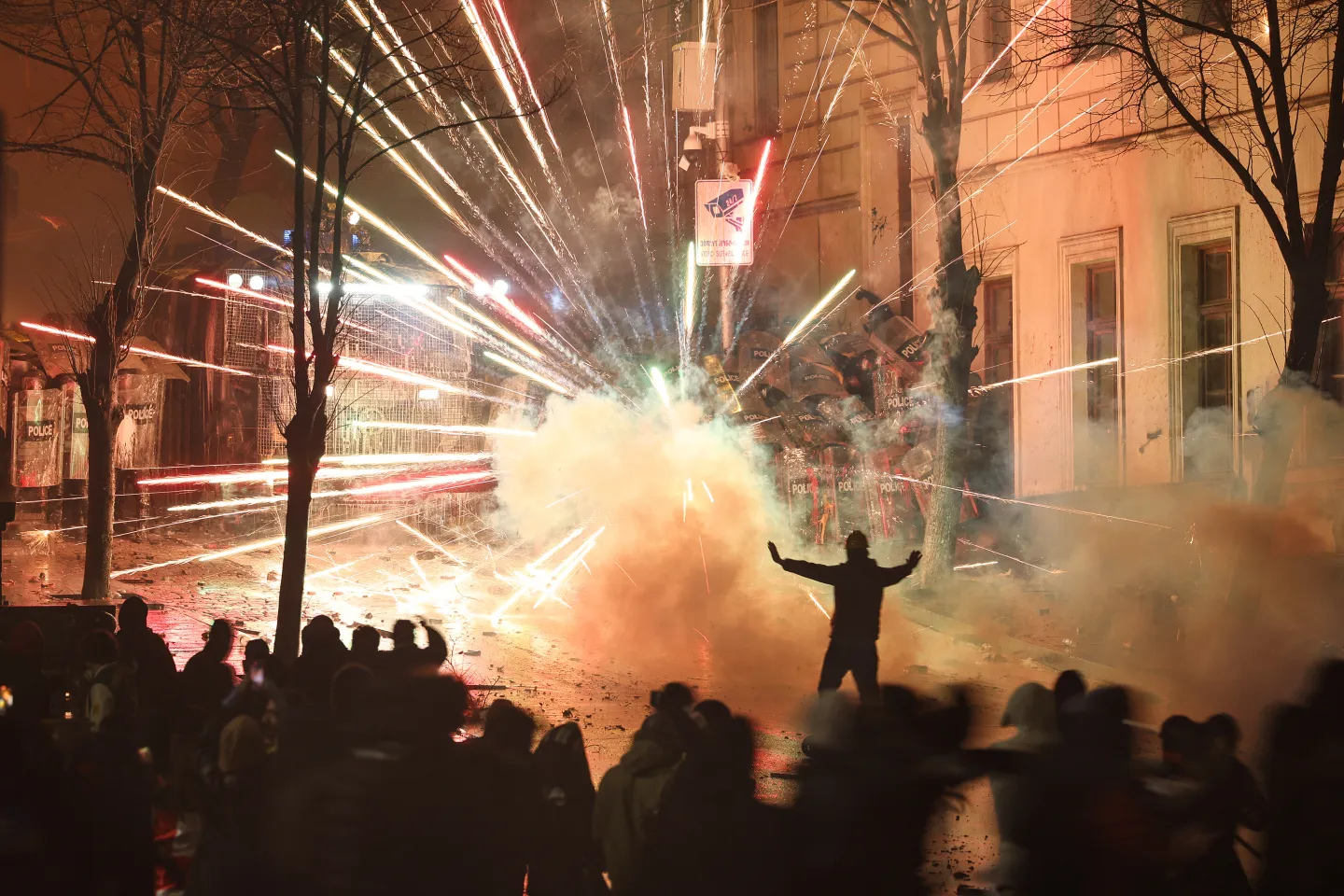
Additionally, MIA officers raided the home of Davit Kezerashvili, the founder of TV company Formula. Kezerashvili attributed this action to a decision by the Strasbourg Court earlier that day, which found that his right to a fair trial had been violated in the so-called training case. This case accused Kezerashvili of embezzling €5.06 million through a defense training project, though prosecutors were unable to substantiate the claims.
Political parties that emerged victorious in the October 26, 2024 elections issued a statement reiterating their demands:
“Once again, we clearly state the demands to Bidzina Ivanishvili, the fulfillment of which is necessary to overcome the crisis:
- Immediately release all illegal, political prisoners detained during the rallies and discontinue all cases against them.
- Schedule new elections, which will be conducted by a new, independent election administration and will be held under the conditions of political neutrality of law enforcement agencies! The victory of Georgia, our freedom, is inevitable!”
International responses intensified as well.
The US State Department Spokesperson Matthew Miller condemned the Georgian Dream government’s violent actions, stating:
“The United States strongly condemns the brutal and unjustified violence of the Georgian Dream against the citizens of Georgia. We will use the tools at our disposal to promote accountability for those who seek to undermine Georgia’s democracy.”
U.S. Secretary of State Antony Blinken echoed these sentiments and announced impending sanctions:
“The U.S. strongly condemns Georgian Dream’s brutal and unjustified violence against Georgian citizens. We will use the tools at our disposal to promote accountability for those who seek to undermine Georgia’s democracy.”
Meanwhile, Ukraine imposed sanctions on Bidzina Ivanishvili, the honorary chairman of the Georgian Dream party, and 18 senior officials, including Grigol Liluashvili, Tea Tsulukiani, and Kakha Kaladze. Ukrainian President Volodymyr Zelensky justified the move:
“Ukraine has imposed sanctions on Ivanishvili and his accomplices—19 individuals. They are the ones who are selling out the interests of Georgia and its people. And we call on Europe, America and everyone in the world to do the same—to act with principle.”
In parallel, Dutch Foreign Minister Kaspar Feldkamp announced that the Netherlands would appeal to the EU to suspend Georgia’s visa-free regime:
“The violence against protesters and journalists, and the arrests of politicians in Georgia are unacceptable. That is why the Netherlands will call on the EU to suspend its visa-free arrangements with Georgia. I welcome the Baltic initiative to impose individual travel bans.”
Day 9
Rallies on Rustaveli Avenue continued on December 6, marked by the use of pepper spray, water cannons, disproportionate force by riot police, and multiple arrests.
The red security level in the Parliament was downgraded to yellow.
On the same day, the Tbilisi City Court sentenced Nika Gvaramia, leader of the Coalition for Change, to 12 days of administrative detention. Aleko Elisashvili, a member of the Strong Georgia party, was also sentenced to detention as a preventive measure. The Ministry of Internal Affairs accused him of attacking and physically assaulting Ali Babaev, a Georgian Dream member.
During a search at the residence of a family member of former Defense Minister Davit Kezerashvili, the MIA seized registered and unregistered weapons.
According to the Ministry, 48 protesters, including journalist Beka Korshia, were detained during the night of December 6–7. The Ministry stated that protest participants threw pyrotechnics and various objects at the Parliament building and law enforcement, injuring one MIA employee.
Lithuanian President Gitanas Nausėda, Latvian President Edgars Rinkēvičs, Estonian President Alar Karis, and Polish President Andrzej Duda issued a joint statement condemning violence against Georgian citizens. They called on Georgian Dream to immediately cease violent actions and uphold freedoms of assembly and expression.
European Parliament President Roberta Metsola emphasized the Parliament’s commitment to supporting Georgia’s European path.
On December 6, a joint statement was released by economists and over 1,000 representatives of the IT sector, condemning violence and illegal detentions. Additionally, more than 90 musicians published a manifesto addressing the country’s current situation.
Day 10
The morning of December 7 saw the conclusion of the march by protest participants, with demonstrations resuming in the afternoon.
Protesters in Tbilisi began gathering at Tbilisi State University before marching toward the Parliament of Georgia. Meanwhile, police mobilized, but no special measures were used to disperse the rally.
In the evening, disturbing footage surfaced showing masked “titushky” brutally attacking TV Pirveli journalist Maka Chikhladze, cameraman Giorgi Shetsiruli, and journalist Maka Janashia. The Special Investigation Service has launched an investigation into the incident.
The same violent group stormed the “Coalition for Change” office, physically assaulting several people, including party member Koba Khabazi. Actor Giorgi Makharadze was also attacked and beaten.
President Salome Zourabichvili condemned the violence on social media, labeling the attack on the TV Pirveli crew as “terror” and accusing Georgian Dream of revealing its true face even during live broadcasts.
In contrast, Mamuka Mdinaradze, a Georgian Dream member, dismissed the incidents as a likely provocation, stating there was “a 99% chance this was staged against the backdrop of a dead battery.”
On December 7, President Zourabichvili, visiting France, held meetings with key figures, including US President Donald Trump, French President Emmanuel Macron, billionaire Elon Musk, and Italian Prime Minister Giorgia Meloni.
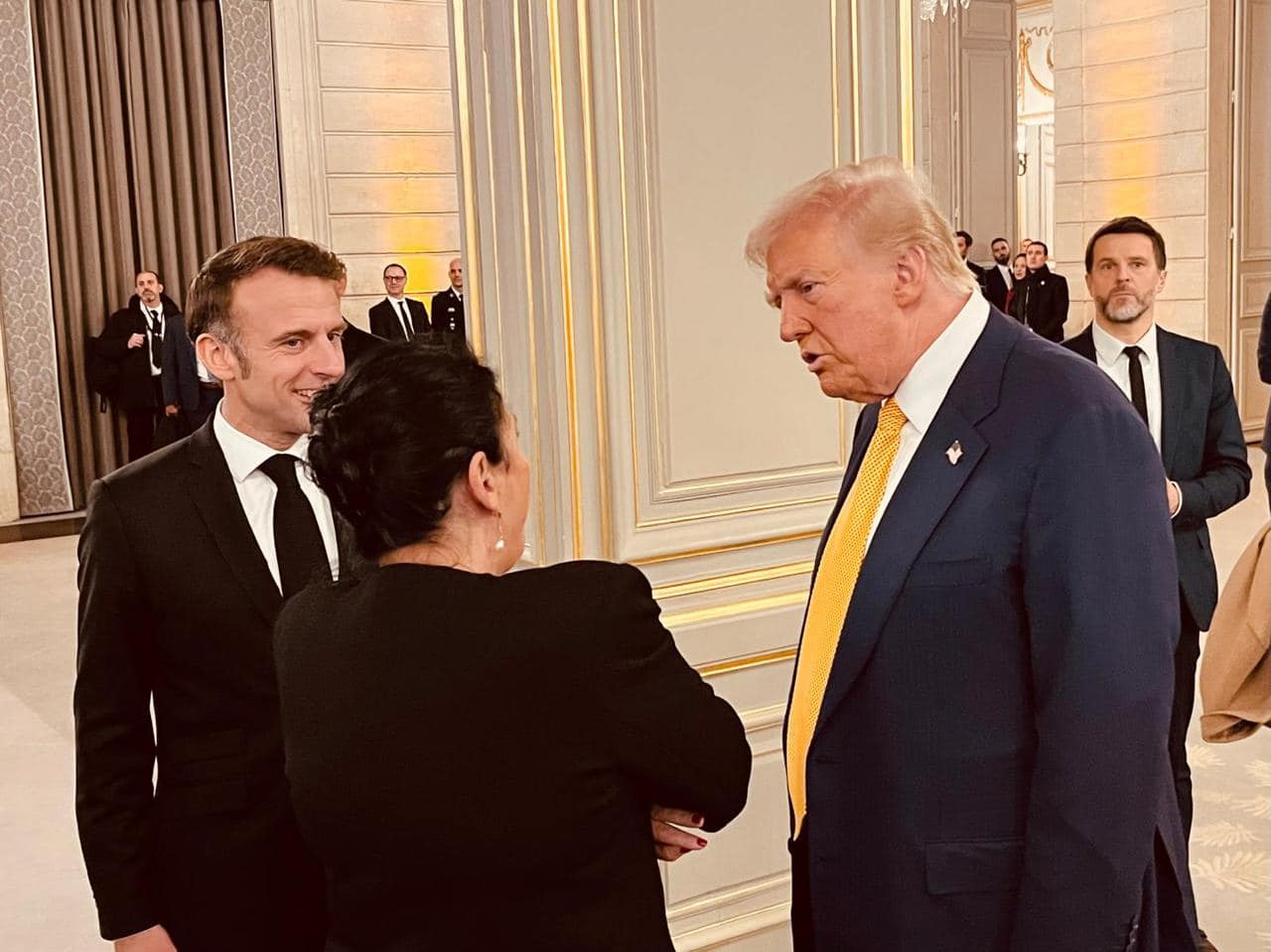
In a statement, Zourabichvili said, “I had an in-depth discussion with President Trump and President Macron. I exposed the stolen elections and the alarming repression against the Georgian people. I emphasized the need for a strong US. The Georgian people have a friend in Donald Trump. God bless the United States of America.”
US Senator Ben Cardin, a member of the Helsinki Commission, commented on the events in Georgia, warning that the US might take measures against those perpetuating violence in the country.
Additionally, a European Commission report released on December 7 revealed that discussions are underway regarding the possible activation of a visa suspension mechanism for certain categories of individuals in Georgia.
Day 11
On December 8, the 11th day of protests, demonstrations resumed with a rally in support of media representatives. Journalists, cameramen, TV hosts, and other media professionals gathered at Republic Square at 3:00 PM to show solidarity with their injured colleagues.
The media representatives’ rally was organized the night before, following the release of footage showing an attack on TV Pirveli reporter Maka Chikhladze and cameraman Giorgi Shetsiruli. Masked individuals brutally assaulted the TV Pirveli team, requiring both victims to be hospitalized. Protesters demanded a timely investigation and the punishment of the perpetrators.
Alongside Tbilisi, media representatives held rallies in other cities across Georgia, including Kutaisi, Batumi, and Gori, where demonstrators symbolically left equipment outside police buildings. Media professionals also condemned the violence against their colleagues in Kakheti.
From Republic Square, media representatives marched to the Parliament building, the traditional location of protests, where they joined other demonstrators.
Despite the ongoing protests, Tbilisi City Hall began constructing the city’s central Christmas tree early on December 8. Demonstrators hung photos of those injured and detained during the protests, along with flags of Georgia, the European Union, Ukraine, and the United States, on the unfinished structure, expressing their dissatisfaction in this way. Police surrounded the newly installed Christmas tree.
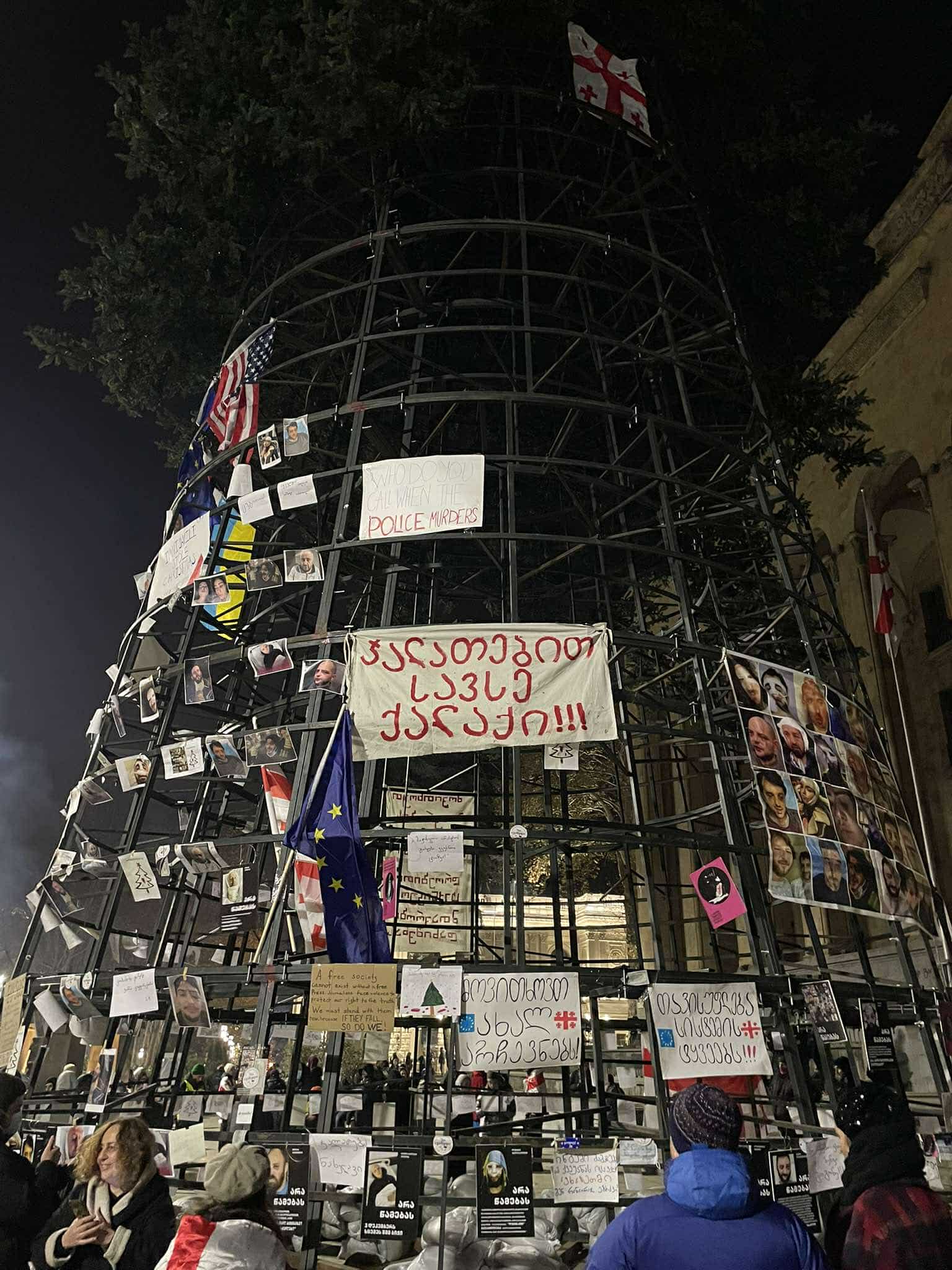
Citizens gathered on Rustaveli Avenue demanded the identification and punishment of the perpetrators, as well as the release of detained protesters. The 11th day of protests concluded without any violent dispersals or arrests.
Simultaneously, Georgian emigrants held a rally in New York. The protesters expressed solidarity with the demonstrators in Georgia, condemned the election results, and demanded a re-vote.
At the City Court, TBC Bank employees gathered to support two of their colleagues, Giorgi Maisuradze and Giorgi Korkadze. TBC Bank also issued a statement expressing solidarity with all detained participants of peaceful protests and called for the immediate release of its employees.
In the evening of December 8, Giorgi Vashadze, one of the leaders of the United National Movement party, was served a summons at his home by officers from the Ministry of Internal Affairs’ Criminal Police Department. He was called in for questioning as a witness in a case under Article 225 of the Criminal Code, which concerns organizing and participating in group violence. Vashadze refused to sign the summons without a lawyer present.
Day 12
Protests in Tbilisi and major cities across Georgia resumed for the 12th consecutive day. On December 9, around 10 a.m., musicians, actors, and directors gathered outside the Ministry of Culture to denounce the ongoing anti-democratic processes in the country. Protesters urged their colleagues to join in expressing dissent.
Simultaneously, an event titled “Architects for Solidarity” took place near City Hall. Following this, they joined demonstrators near the Georgian Public Broadcaster building.
This time, representatives from various sectors assembled near the Georgian Public Broadcaster, demanding management changes and access to airtime. A subsequent meeting between protest representatives and the broadcaster’s administration resulted in an agreement. General Director Tinatin Berdzenishvili announced that, starting from December 10, at 10:00 p.m. daily, the broadcaster would allocate airtime to individuals wishing to express their views: “This will be an equal platform. Our proposal to host discussions remains in place, and if there is readiness, we will address these issues live.”
Another protest occurred outside the Imedi television channel, where members of former Prime Minister Giorgi Gakharia’s party, For Georgia, gathered, calling for editorial policy changes. Party representatives accused Imedi of promoting government propaganda and failing to provide objective coverage of ongoing events. In response, the television’s management labeled these demands as interference with their editorial independence.
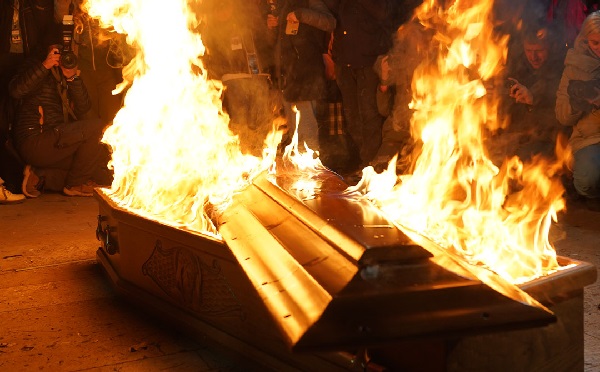
As protests continued on Rustaveli Avenue, the evening demonstration concluded without incident. However, reports emerged later that night about the arrests of several demonstrators in Tbilisi and Kutaisi. According to Nona Kurdovanidze, chairperson of the Georgian Young Lawyers’ Association, seven individuals were detained overnight.
On the same day, British Foreign Secretary David Lammy issued a statement:
“The United Kingdom is immediately suspending programmatic support for the Georgian government, limiting cooperation in defense matters, and restricting engagement with representatives of the Georgian Dream government.”
Day 13
On December 10, the 13th day of protests, demonstrations continued in Tbilisi and regions across Georgia. In the capital, a group of demonstrators initially gathered outside the Ministry of Internal Affairs, bringing photos of citizens and journalists injured during the protests. After concluding the protest at the Ministry, participants moved to Rustaveli Avenue.
On this day, Rustaveli Avenue was once again blocked. In the evening, demonstrators assembled in front of the Parliament building with their consistent demands: calling for new elections, punishing perpetrators of violence, and releasing unlawfully detained individuals. The protest concluded without any dispersals; however, according to the Ministry of Internal Affairs, six individuals were arrested under administrative law during the night of December 10-11.
The Public Defender of Georgia, Levan Ioseliani, made a statement about those injured and detained during the protests. According to Ioseliani, members of the Ombudsman’s Office met with 327 detainees, 225 of whom reported mistreatment, while 157 showed signs of physical injuries. The Public Defender urged the Special Investigation Service to conduct a thorough investigation of each case.
On December 10, President Salome Zourabichvili awarded representatives of the media who were harmed during the protests for their civil dedication at the Orbeliani Palace.
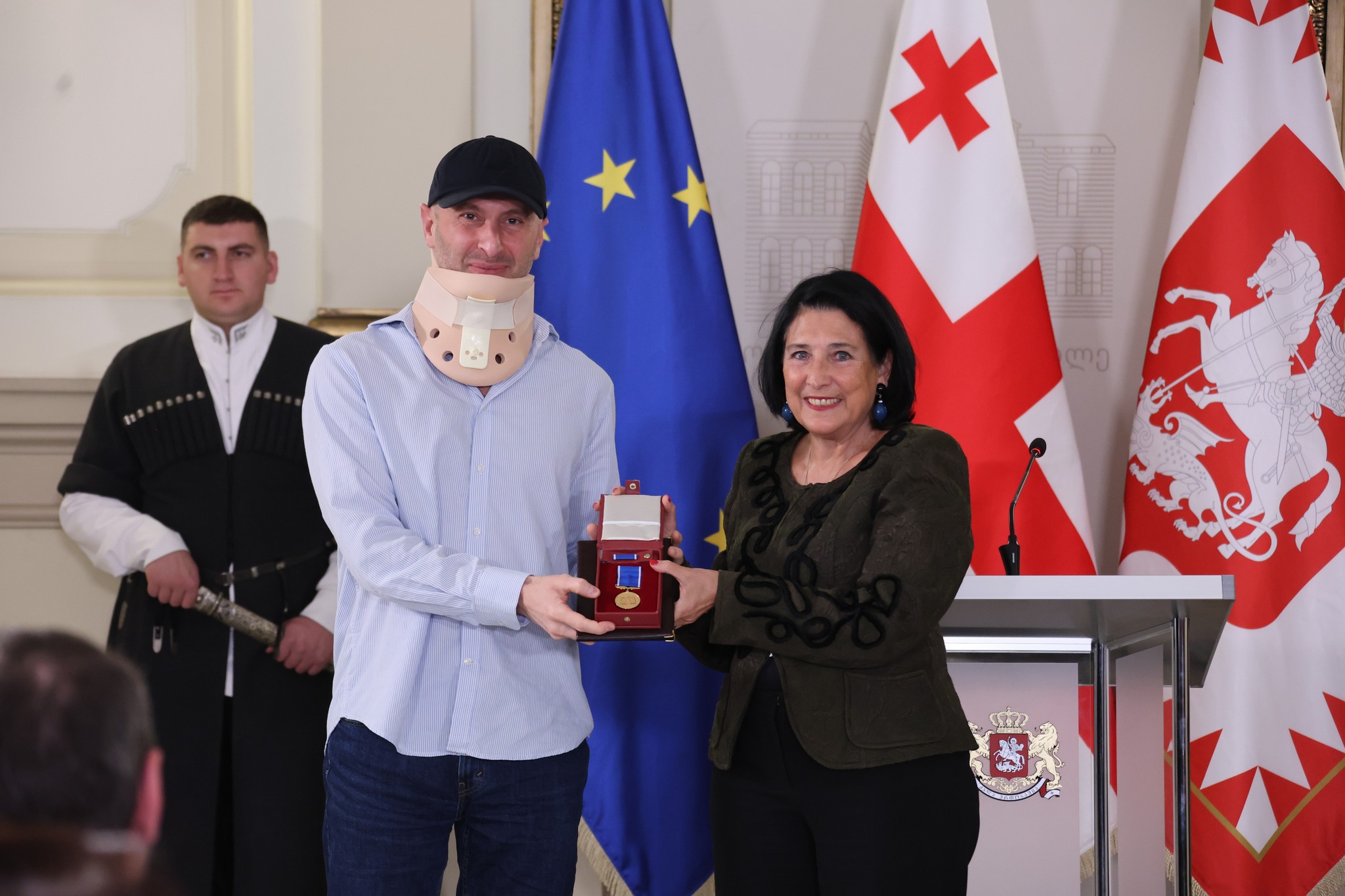
The international response to the ongoing events in Georgia remains strong. During a press conference, U.S. State Department spokesperson Matthew Miller once again condemned the situation in Georgia, reiterating that the U.S. is considering all tools at its disposal, including sanctions, to address the issue.
Former U.S. Secretary of State Hillary Clinton also voiced her support for Georgia, expressing solidarity with President Salome Zourabichvili:
As women leaders, we call on the international community to act decisively to protect Georgia’s democracy and the unwavering courage of its people and its President.
Additionally, the EU spokesperson issued a statement regarding the situation in Georgia. Anita Hipper, the EU’s lead spokesperson for foreign and security policy, announced that the EU will consider additional measures during the Foreign Affairs Council meeting on December 16.
Day 14
On December 11, the 14th day of protests, public servants organized a march in Tbilisi. Government employees and workers from budgetary organizations began their procession at Republic Square, eventually joining demonstrators near Parliament.
During the march, participants carried a banner inscribed with their oath:
We serve the people and the state, we uphold the Constitution of Georgia.
This display underscored their loyalty to Article 78 of the Constitution and expressed solidarity with their colleagues, as well as with individuals unlawfully detained or injured during the demonstrations.
Later in the day, protesters successfully blocked Rustaveli Avenue once more. The protest concluded peacefully without confrontations. However, the Ministry of Internal Affairs reported the arrest of one individual accused of damaging property in a group action.
Meanwhile, on the same day, the ruling Georgian Dream party approved, in its first reading, amendments to the Law on Assemblies and Demonstrations. The new rules prohibit protesters from using pyrotechnics, lasers, or masks to cover their faces during rallies. These amendments were fully adopted in three readings within just two days.
A phone call between Georgian Dream’s honorary chairman, Bidzina Ivanishvili, and French President Emmanuel Macron also took place on December 11. According to the French president’s press office, Macron condemned the recent intimidation of opposition figures, police violence against protesters and journalists, and called for the release of detained demonstrators. He emphasized the need to uphold freedom of expression and assembly.
Additionally, Czech President Petr Pavel issued a statement regarding Georgia’s developments. Pavel spoke with his Georgian counterpart, denouncing violence against journalists and protesters while voicing his full support for the Georgian people.
Human Rights Watch urged the European Union to impose sanctions on the Georgian government. Iskra Kirova, Advocacy Director for Europe and Central Asia, and Giorgi Gogia, Associate Director, released a joint statement ahead of the EU Foreign Affairs Council meeting, scheduled for December 16, to address Georgia’s ongoing political crisis.
Day 15
On December 12, protests resumed in Georgia with a march by representatives of the technology sector. IT and tech employees gathered at Republic Square with the same demands: holding new elections, releasing those unlawfully detained, and prosecuting those responsible for acts of violence.
The demonstrators at Republic Square were joined by citizens who had gathered near the Conservatory, and together they marched toward the Public Broadcaster building, later continuing to City Hall. At the same time, doctors held a rally near the Medical University, condemning incidents of violence against protesters and journalists.
On the 15th day of protests, citizens blocked Rustaveli Avenue. Protesters gathered outside Parliament were joined by a seven-member delegation from the European Union, who expressed their support by unfurling the EU flag.

At the protest, Member of the European Parliament Rasa Juknevičienė made comments to the media, stating, “The Georgian people are fighting not only for their own freedom but also for the freedom of the European continent.” She added that without elections, it would be impossible for Georgia to return to the path of EU integration.
The December 12 protest concluded peacefully, with no reports of confrontations between demonstrators and law enforcement. However, earlier in the day, reports emerged about the arrest of Vato Blazhava, a Rondeli Foundation researcher and activist.
International journalists and editors from the global and Central and Eastern European networks of the International Press Institute (IPI) responded to the events in Georgia with an open letter. The joint statement, signed by 78 prominent editors, journalists, and media representatives, highlighted the violent attacks on journalists and expressed solidarity with Georgian colleagues during what they described as a challenging time for democracy and press freedom.
On the same day, The Hill reported that the Biden administration was considering visa restrictions for Georgian officials. These rumors were confirmed within hours when the U.S. Department of State released an official statement.
According to the State Department, visa restrictions were imposed on 20 Georgian officials, including ministers, parliament members, law enforcement officers, security service representatives, and private individuals. The Department stated that visa issuance would be denied to those responsible for undermining democracy in Georgia or complicit in the process.
Day 16
On December 14, the 17th day of protests in Tbilisi, demonstrators gathered outside the Parliament building from 8:00 AM, staging a protest titled “Show Kavelashvili a Diploma.” They distributed “red cards” to citizens, symbolically opposing the appointment of former footballer Mikheil Kavelashvili as Georgia’s next president.
President Salome Zourabichvili joined the morning protest, receiving cheers from participants, before moving to the Orbeliani Palace to meet with members of the “Mothers’ March.”
Inside Parliament, the electoral college proceeded with the indirect election of the new president. Over five hours, the sole candidate, Mikheil Kavelashvili—nominated by the ruling Georgian Dream party—was elected with 224 out of 225 votes. Following the announcement, protesters released black smoke as a symbolic act of dissent.

President Zourabichvili criticized the election as unconstitutional and disconnected from legitimate political processes. In contrast, leaders from Azerbaijan, Armenia, Serbia, and Belarus extended congratulations to Kavelashvili.
Western reactions were swift. U.S. Helsinki Commission Chairman Joe Wilson stated that Salome Zourabichvili remains Georgia’s legitimate president. Michael Roth, Chair of the German Bundestag’s Foreign Affairs Committee, described Kavelashvili’s election as another attempt to undermine constitutional institutions.
Protests continued throughout the day near Parliament. Water cannons were on standby in the morning, and law enforcement maintained a presence into the evening.
That evening, Tbilisi Mayor Kakha Kaladze had planned a ceremony to light the city’s central Christmas tree. A stage was set up on Rustaveli Avenue, but Kaladze postponed the event, blaming the “radical opposition” for the cancellation.
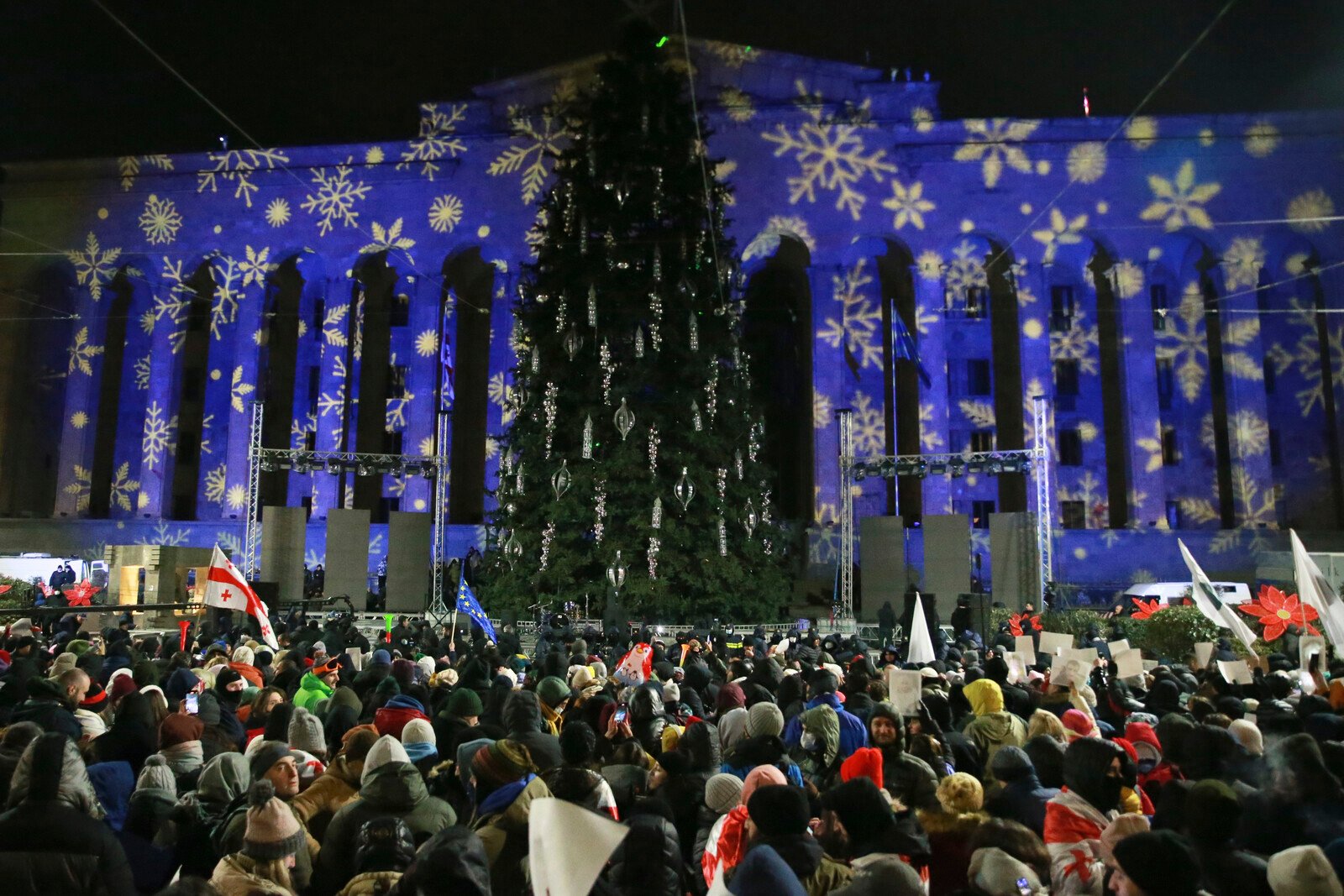
The 17th day of protests concluded peacefully. However, reports emerged in the morning of the brief detention of Niko Kvatabia, a member of the Droa party, who was later released.
Day 18
On December 15, 2024, the Parliament of Georgia expedited amendments to the Administrative Offenses Code, introducing stricter penalties for actions associated with protests:
- Drivers joining protests who are deemed by police to impede traffic may face a fine of 1,000 GEL and a one-year driver’s license suspension.
- Fines for placing protest-related stencils, inscriptions, or posters without permission have increased to a range of 50 to 1,000 GEL.
- Individuals blocking roads during protests, if deemed insufficient in number by patrol police, may be fined 5,000 GEL (up from 500 GEL). Organizers face fines up to 15,000 GEL or up to 15 days of administrative detention.
- Holding pyrotechnics at protests is punishable by a 5,000 GEL fine, increasing to 15,000 GEL for organized groups.
- Covering one’s face with masks or other means during protests incurs a 2,000 GEL fine.
- Carrying laser pointers or similar devices that could hinder state officials’ duties or disrupt technical equipment, such as surveillance cameras, results in a 2,000 GEL fine.
- If minors at protests disobey police orders and are deemed offenders, both the individual and their parent may be fined between 100 and 300 GEL.
Concurrently, the Parliament amended the Public Service Law, affecting certain public servants who opposed the ruling party’s decision to delay EU integration until 2028:
- Heads and deputy heads of primary structural units in public institutions are no longer considered public servants but are now employed under administrative contracts, allowing termination with one month’s notice and compensation.
- Decisions to dismiss employees due to reorganization are immediately effective, even if appealed.
- All hierarchical public servants will undergo evaluations every six months, instead of annually.
- Receiving an unsatisfactory evaluation may lead to a 20% salary reduction until the next assessment period.
- The mobility rule no longer applies in reorganization cases.
Despite these legislative changes, protests continued across Tbilisi and other regions for the 18th consecutive day. On December 15, professionals from various fields marched through the capital’s streets to the Parliament building.
In response to the Georgian government’s recent actions, Lithuania and Estonia expanded their sanctions lists, targeting additional Georgian officials, including Prime Minister Irakli Kobakhidze. Lithuania sanctioned 16 individuals, while Estonia sanctioned 14 officials.
The Georgian government criticized these sanctions, suggesting that the decisions by Lithuania and Estonia were influenced by external parties and questioning the sovereignty of these nations.
Day 19
Protests continued in Tbilisi and other major cities of Georgia on December 16, marking the 19th consecutive day of demonstrations. From the early hours, marches were organized across the capital’s streets, joined by representatives of various professions.
On December 16, demonstrators blocked Rustaveli Avenue in front of the Parliament building. Before the protest began, the Tbilisi City Hall turned on the New Year’s illuminations and lit the city’s main Christmas tree without any official ceremony. Several clashes between demonstrators and unidentified individuals were reported during the day, and the police arrested the attackers.
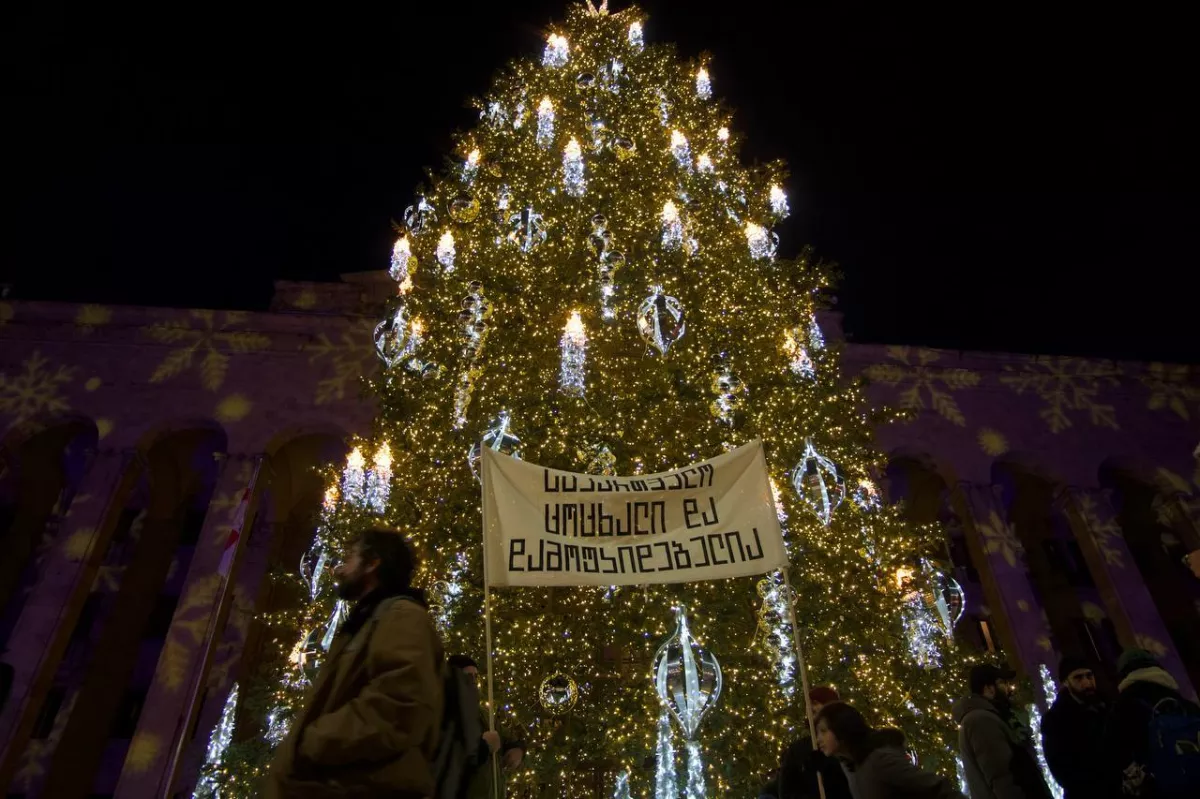
On the same day, the European Union’s foreign ministers convened a scheduled meeting to discuss the situation in Georgia. Ministers from 27 European countries debated imposing sanctions on Georgian officials due to the recent developments. However, Hungary and Slovakia blocked the proposal.
Rikard Jozwiak, Europe editor for Radio Free Europe/Radio Liberty:
Debate among 🇪🇺 foreign ministers on 🇬🇪 over. As expected, 🇭🇺🇸🇰 block sanctions. European Commission will however propose visa lib suspension for 🇬🇪 diplomats, possibly as early as this week. there is a qualified majority for this.
— Rikard Jozwiak (@RikardJozwiak) December 16, 2024
The agreement on the need to suspend visa-free travel for Georgian diplomatic passport holders was later confirmed by the EU High Representative for Foreign Affairs and Security Policy, Kaja Kallas. In a statement following the meeting, Kallas said that the European Commission would present the proposal by the end of the year.
On December 16, the U.S. State Department spokesperson, Matthew Miller, held a briefing. Miller announced that the United States is preparing an additional package of sanctions, which is expected to be unveiled in the coming weeks.
The Organization for Security and Co-operation in Europe (OSCE) also issued a statement on the same day, condemning the violence against citizens exercising their fundamental rights:
We are deeply concerned about the current situation in view of reports of violence against the Georgian citizens exercising their fundamental rights. We call on the Georgian authorities to take immediate action to end the persecution of civil society, media and the political opposition.
Day 20
The 20th day of protests in Tbilisi was marked by a march involving representatives from various professional groups. On December 17, members of the hospitality industry, historians, and students organized protest marches. The demonstrators gathered in front of the Parliament building, blocking Rustaveli Avenue.
Some protesters also assembled at the EU Delegation in Georgia. Others mobilized at the Public Broadcaster headquarters, calling for daytime airtime to be allocated for public discourse.
In the evening, reports surfaced about an attack on Giorgi Vashadze, leader of the opposition party Unity – National Movement. Vashadze accused the assailant, allegedly linked to Bidzina Ivanishvili, of attempting to intimidate protesters. “No one is afraid of you, Ivanishvili; you will be held accountable,” Vashadze declared.
On the same day, the European Parliament held a debate on the situation in Georgia. MEPs discussed the ongoing protests, potential sanctions, and the controversial appointment of Mikheil Kavelashvili as president. Several statements affirmed Salome Zurabishvili as the only legitimate president of Georgia.
Dubravka Schuitsa, Vice-President of the European Commission, criticized the Georgian government’s failure to address citizens’ demands. Lithuanian MEP Rasa Jukneviciene, who recently visited Georgia, described the situation as “appalling” and called for individual sanctions against Georgian officials. The Slovak and Hungarian governments’ veto of proposed sanctions drew sharp criticism from Bundestag Foreign Affairs Committee Chairman Mikhail Roth, who labeled their actions as supportive of authoritarianism.
In response to Prime Minister Irakli Kobakhidze thanking Romania, Italy, Spain, Hungary, and Slovakia for blocking sanctions against officials of the Georgian Dream government, several foreign ministries issued clarifications:
- The Romanian Foreign Ministry criticized the suspension of EU accession talks and condemned the violent suppression of protests.
- The Spanish Foreign Ministry expressed concern over civil rights in Georgia, warning that disinformation poses a threat to democracies.
- The Italian Foreign Ministry reiterated its support for proposed EU measures, including sanctions, and backed suspending diplomatic visas.
The Czech Foreign Ministry also condemned the violence against peaceful protesters and announced €230,000 in emergency aid to support Georgian civil society and independent media.
Day 21
On December 18, Georgia’s incumbent President Salome Zurabishvili addressed the European Parliament. In her speech, she informed the MEPs about the ongoing events in Georgia.
During her address, President Zurabishvili touched on this year’s parliamentary elections, the Georgian Dream party’s decision to suspend negotiations with the EU until 2028, the protests, their violent suppression, and the legislative decisions adopted by Parliament:
It is clear that the people of Georgia will not stop until free and fair elections are held in the country. This is the only democratic and political path to resolve this crisis.
She also called on the European Parliament for immediate action:
“While the Georgian people fight day and night, Europe responds slowly. I hope we won’t have to wait for an even greater crisis before Europe takes action.”
On the same day, Alan Berset, Secretary-General of the Council of Europe, paid an official visit to Georgia. Berset met with Irakli Kobakhidze, Bidzina Ivanishvili, and representatives of civil society.
“Constructive exchange this evening with representatives of the international community in Tbilisi. We discussed the current situation in Georgia and the key role of the Council of Europe Action Plan 2024-2027 in strengthening democracy, human rights and the rule of law,” Berset wrote on X.
Foreign officials also continue to comment on the situation in Georgia. American diplomat Daniel Fried wrote on X:
“Repression in Georgia – Russia’s hand behind it – is part of the Kremlin’s effort to rebuild its Empire & weaken the US & its friends. The Biden administration has options long prepared. In its final month, it must act to advance US interests & values.”
Germany’s government has announced plans to reassess its relations with Georgia. Bundestag member Robin Wagener stated:
“The Georgian Dream has completely turned its back on democratic values and Europe. The German government has already canceled initial aid projects and will now reevaluate its cooperation with Georgia.”
Wagener also emphasized the necessity of targeted sanctions.
Meanwhile, protests continued across Tbilisi and other major cities in Georgia for the 21st consecutive day. Demonstrators are demanding new parliamentary elections, the release of illegally detained individuals, and the prosecution of those responsible for violence. Before gathering near Parliament, several protest marches took place throughout Tbilisi, involving representatives from various sectors.
Information will be updated…
Forbes Georgia: სარედაქციო გუნდი

